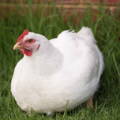
Poultry Lice: Understanding, Treating and Preventing Infestations
Discover what poultry lice are, how they infest chickens, treatment options, and prevention strategies to keep your flock healthy. Expert insights for proactive poultry care.
FUN FACT: Poultry lice are not known to spread any avian pathogens.
Subscribe
To join our mailing list and never miss an update!
Poultry lice, also known as chicken lice, are tiny parasites that can wreak havoc on a chicken flock if left unchecked. In this article, we will delve into what poultry lice are, how chickens become infested, effective treatment methods, and strategies for preventing these pesky parasites from causing harm.
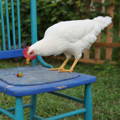
Understanding Poultry Lice
Poultry lice are ectoparasites that primarily affect chickens and other domesticated birds. These minuscule insects belong to the Phthiraptera order and feed on the feathers, skin, and blood of their host birds. While they may not pose a direct threat to humans, they can significantly impact the health and well-being of chickens.
There are two main types of poultry lice: biting lice (Mallophaga) and sucking lice (Anoplura). Biting lice feed on the feathers, skin fragments, and debris on the bird, while sucking lice pierce the skin to feed on blood. Regardless of the type, a lice infestation can lead to irritated and stressed birds, decreased egg production, feather loss, anemia, and, in severe cases, even death.
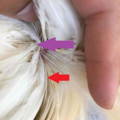
how Chickens Get Poultry Lice
Poultry lice are highly contagious and can spread rapidly through a flock. Chickens often get lice from contact with infested birds, contaminated bedding, or even wild birds and rodents.
Unlike some other poultry diseases, lice infestations are not caused by unsanitary conditions alone. Even well-maintained coops can fall victim to these pests. Lice thrive in warm, humid environments, making the coop an ideal breeding ground.
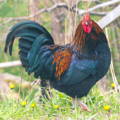
Poultry Lice Treatment
Prompt and effective treatment is essential to control and eliminate poultry lice infestations. Here are some steps to consider when dealing with these pests:
1. Isolate Infected Birds: As soon as a lice infestation is suspected, isolate the affected birds from the rest of the flock to prevent the spread of lice.
2. Deep Cleaning: Thoroughly clean and disinfect the coop, including nest boxes, roosts, and any other areas where lice may hide. Remove and replace old bedding with fresh, clean material.
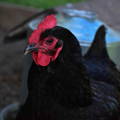
3. Dusting and Spraying: There are various dusting powders and sprays available that are specifically designed to target poultry lice. These products often contain natural or chemical compounds that kill lice on contact. Be sure to follow the manufacturer's instructions for proper usage.
4. Bathing and Grooming: In cases of severe infestations, some chicken owners opt for giving their birds a gentle bath using mild shampoos or insecticidal soaps. Afterward, carefully inspect the birds and manually remove any remaining lice.
5. Repeat Treatment: Lice have a lifecycle, and their eggs (nits) are often resistant to treatment. It's crucial to repeat the treatment process after a certain period to ensure that any newly hatched lice are also eliminated.
6. Consult a Veterinarian: If the infestation is particularly severe or if you are unsure about the best course of action, consult a veterinarian with experience in poultry health. They can provide guidance on effective treatment methods and recommend appropriate products.
Trending Articles
preventing Poultry Lice Infestations
While treating an existing infestation is crucial, preventing lice from infesting your flock in the first place is equally important. Here are some preventive measures to consider:
1. Regular Health Checks: Regularly inspect your chickens for signs of lice, such as feather loss, itching, or irritated skin. Early detection can help prevent the infestation from spreading.
2. Quarantine New Birds: Whenever you introduce new birds to your flock, isolate them in a separate area for a few weeks to monitor their health and prevent the introduction of lice or other diseases.
3. Maintain Cleanliness: Keep the coop and surrounding areas clean and dry. Regularly remove litter, debris, and old bedding to discourage lice from finding suitable breeding environments.
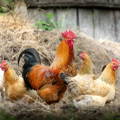
4. Dust Bathing Areas: Provide your chickens with designated dust bathing areas. Dust baths help chickens naturally control lice by allowing them to coat themselves in fine dust, which suffocates and dislodges the parasites.
5. Use Preventive Treatments: Some poultry keepers use herbal sprays or diatomaceous earth as natural preventive measures against lice. These substances are believed to create an environment less conducive to lice survival.
6. Limit Contact with Wild Birds: Wild birds can introduce lice to your flock. Minimize the risk by keeping wild birds away from your coop and feed storage areas.
7. Monitor Flock Density: Overcrowding can increase stress among chickens, making them more susceptible to lice infestations. Maintain an appropriate flock density to promote overall bird health.
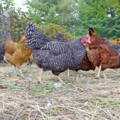
Poultry lice infestations are an unfortunate reality of chicken keeping, but they can be managed with vigilance, proper care, and swift action. Understanding the life cycle of these parasites, how they spread, and effective treatment methods is crucial for maintaining a healthy and thriving flock.
By implementing preventive measures and regular health checks, poultry keepers can significantly reduce the risk of lice infestations and ensure the well-being of their feathered companions. Remember, a proactive approach to poultry lice is the key to a successful and rewarding poultry farming experience.
Trending Products
Copyright©2023 All rights reserved. We love to have you share our article as long as you include a direct link to this page. This article or any portion thereof , including all images, may not be reproduced or used in any manner whatsoever without the express written permission of Gypsy Shoals Farm.



